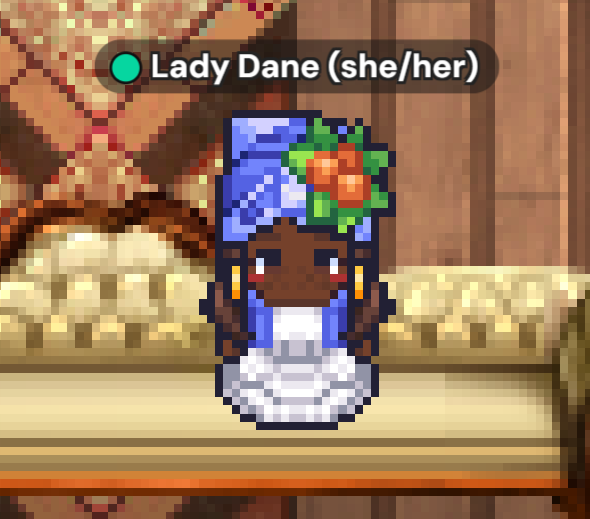From artists touring together, to founding an organization and working to build collective power together, I am so very grateful to have such a powerful kin connection with the brilliant Lady Dane! As we prep for Saturday's workshop on Reparations Frameworks, we chatted a bit about what it means for two Black Trans folks to be moving communities we love towards fuller understandings of Reparations. Below, is a snippet of that conversation! I hope you enjoy, and that you will join us on Saturday to get more free!
Until next our avatars meet,
🪻J Mase

What is one of the most misunderstood aspects of Reparations that people should know?
Lady Dane: The idea that any progress that Black people have always deserved and had to fight to get, is reparations. For over a century since the passing of the 13th Amendment, there has been a pervasive sentiment with the American Mainstream that the country itself cannot pay reparations or has paid reparations by the passing of legislation which at the bare minimum (in its language) simply honors the fact that Black people are human.
[That] there is legislation on the books that have leveled the playing field for all citizens, but we all know that is not the case. Black people are still disproportionality impacted by chattel slavery legacies and its economic inequalities that have been put in place. Meanwhile, we can point to living white people, some of which hold positions of systematic/ legislative power, whose families are built off of slave labor.
J Mase: That believing in reparations to Black Americans who are the descendants of enslaved peoples somehow means you are uninterested or invested in reparations to other communities harmed by Western empire. So much humanity is robbed from Black folks when we say, repairing harm is impossible, or that our fight is somehow in opposition to the plight of other targeted peoples.
Who are some people that helped shape how you understand the Reparations Movement?
Lady Dane: My Aunt Liz. Whom I talk about a lot, growing up in the Great Blacks In Wax Museum and being mentored by her at a very young age, I was able to engage not only her wisdom, but those of incredible Black Thought Leaders who she knew from her years of Academia, Activism and Art.
J Mase: Honestly, watching organizers be tired, worn out and having little time to rest because they have spent so much time trying to fix issues that started well before their birth. It is through many friends, loved ones, autonomous and collective organizers that I began really understanding what was at stake in regards to reparations and why it is a necessary part of Black Liberation. I learned that we have a right, and duty to be cared for, to get the things we need to thrive and that reparations is so much more than money- it is a framework that demands our healing be prioritized.
What would Trans & Queer folks gain from better understanding Reparations?
J Mase: Let's say it is decided that reparations is going to happen tomorrow...Can Black folks whose ID's are different than their lived reality get access to that? In an ableist country that says if you are on disability and can only have $2k in your bank account at a time, can disabled Black folks have access to that? How would reparations get distributed to houseless Black folks? There are Black Trans & Queer people, period. Black folks are not a monolith, and yet typically when we talk about reparations it is at such a planar level that presumes whoever decides what reparations will be also understands the full breadth of who Black people are. For that to actually happen, a comprehensive plan for reparations at all the levels it needs to happen, Black Trans & Queer folks must be thought of and present.
Trans & Queer folks of all identities and backgrounds who understand the ways they have benefited from the subjugation of the most targeted segments of our community must also be able to understand how reparations moves forward the reality of Trans & Queer liberation.
Lady Dane: One thing I think about Reparations is that in understanding it, you understand history. Trans and Queer folk have been told, by white supremacists, there is no TLGBQ history. These white supremacy perpetuators have also attempted to position Transness and LGBQness as a new thing, versus the fact it is rooted in ancestral wisdom, pre-colonist being, cultivating liberatory practices and resistance to white supremacy. The Practice, engagement and community around the reparations movement [invites] us to examine history and how remnants of it can be found today.
Who should come to this session on Reparations Frameworks?
Lady Dane: Our people. This country owes us something, this country owes us much, and no that does not mean we simply tap our foot and wait, we gotta live, but… no not but, and, and we also gotta be clear that we are owed and no amount of shame the government tries to place at our feet will erase the blame that is clearly at theirs.
J Mase: Any and everyone invested in justice and learning models for reparations.
All That DEI & Still No Reparations?!?! (Open to All) is a workshop on Reparations Frameworks for those invested in moving beyond conversations into actionable steps towards repairing harm against Black communities in the United States and will take place August 31st from 1pm-4pm PT. It will cover:
- Defining Reparations
- A History of Reparations within the US
- Understanding Reparations Frameworks
- Current Reparations Models
- Identifying Roles People of all Racial Backgrounds Can Play in this Work
- Mapping Out Implementation
Garden is a free 24/7 space, but it does cost money for us to maintain it on Gather.Town. If you'd like to donate to this work, consider throwing some money in the pot here. To send donations directly through our 501c3 fiscal sponsor, email us!


